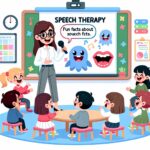Are you ready to delve into the fascinating world of speech disorders in children? In this article, we will unravel the complexities surrounding these communication challenges that many young ones face. As a highly proficient speech-language pathologist with a passion for empowering children, I will be your guide on this enlightening journey. Together, we will explore the intricacies of speech disorders, from their root causes to the impact they can have on a child’s development. Get ready to gain valuable insights and practical guidance to support children with speech disorders in reaching their full potential. So, let’s embark on this empowering adventure and discover the wonders of childhood communication!

Speech Disorders in Children
As a speech-language pathologist, I have witnessed the impact of speech disorders on children’s lives and their ability to effectively communicate. It is crucial for parents, caregivers, educators, and medical professionals to have a clear understanding of speech disorders in children, as early intervention is key to helping these children overcome their communication challenges.
What are Speech Disorders in Children?
Speech disorders in children encompass a wide range of difficulties that affect the ability to produce and articulate sounds, control voice quality, and maintain appropriate resonance. These disorders can manifest as difficulties with speech sounds, voice disorders, or resonance disorders. They can be caused by physical or developmental issues in the mouth, jaw, tongue, or vocal tract.
The Impact of Speech Disorders
A child’s ability to communicate effectively plays a vital role in their overall development. When children struggle with speech disorders, it can significantly impact their academic performance, social interactions, and self-esteem. They may experience frustration, isolation, and difficulties in expressing their wants, needs, and thoughts. Identifying and addressing these challenges early on is crucial for empowering children and supporting their overall growth and development.
Early Intervention and Diagnosis
Early intervention plays a pivotal role in the successful treatment of speech disorders in children. Parents and caregivers are often the first to notice any communication difficulties in their child. If you suspect that your child may have a speech disorder, seeking help from a healthcare provider, such as a speech-language pathologist, is essential.
The evaluation process for speech disorders in children involves assessing a child’s speech and language skills, analyzing their oral-motor abilities, and considering their overall development. Through this comprehensive evaluation, a speech-language pathologist can accurately diagnose the specific speech disorder and formulate an individualized treatment plan for the child.
Treatment Options for Speech Disorders
Speech-language pathologists are experts in diagnosing and treating speech disorders in children. They employ evidence-based intervention strategies tailored to each child’s unique needs. Approaches may include articulation therapy, fluency therapy, voice therapy, or resonance therapy.
Articulation therapy focuses on helping children produce speech sounds correctly, while fluency therapy assists those who struggle with stuttering or other fluency-related challenges. Voice therapy targets voice disorders, such as hoarseness or vocal nodules. Resonance therapy is used to address disorders related to the pitch, loudness, and quality of a child’s voice.
Benefits of Speech and Language Therapy
Speech and language therapy can have a profound impact on a child’s ability to communicate effectively. These therapy sessions not only target the physical aspects of speech but also address language skills and overall communication abilities. Through therapy, children can improve their articulation, fluency, and voice control, leading to enhanced social and academic success.
Early Detection and Prevention
It is important to note that some speech disorders in children may be linked to underlying health problems or disabilities, such as autism or brain injuries. By detecting and addressing speech disorders early on, healthcare providers and parents can prevent potential developmental delays and minimize the long-term impact on a child’s communication abilities.
The Role of Parents and Caregivers
Parents and caregivers play a crucial role in their child’s language development and treatment journey. They are vital partners in supporting their child’s progress by reinforcing therapy techniques and promoting effective communication skills at home. By creating a supportive and nurturing environment, parents and caregivers can empower children with speech disorders to overcome their challenges and reach their full potential.
In conclusion, speech disorders in children can present complex challenges, but with early detection and appropriate intervention, children can overcome these obstacles and develop effective communication skills. As parents, caregivers, educators, and medical professionals, it is our responsibility to empower and support these children, allowing them to thrive and succeed. Remember, together we can make a difference in children’s lives.
“Early intervention is the key to unlocking a child’s true potential and empowering them to communicate confidently.”
Speech is a powerful and captivating form of communication. Did you know there are some fascinating facts about speech that you might not be aware of? If you’re interested in learning more, check out our article on “Interesting Facts About Speech.” It’s filled with intriguing tidbits and surprising information that will leave you awe-inspired. Click here to explore the world of speech: Interesting Facts About Speech.
FAQ
Question 1
What are speech disorders in children?
Answer 1
Speech disorders in children refer to difficulties with producing speech sounds or using language to communicate effectively. These disorders can include problems with articulation, fluency, and phonology.
Question 2
What causes speech disorders in children?
Answer 2
Speech disorders in children can have various causes. They may be due to physical issues with the mouth, jaw, tongue, or vocal tract, or they could stem from developmental issues. Additionally, speech disorders can be associated with certain health conditions or disabilities such as autism or brain injuries.
Question 3
How do speech disorders impact a child’s overall development?
Answer 3
Speech disorders can significantly affect a child’s overall development. Difficulties with speech and language skills can make it challenging for a child to effectively communicate, express their thoughts, and engage in social interactions. This can impact their academic performance, emotional well-being, and overall quality of life.
Question 4
What are the signs that a child may have a speech disorder?
Answer 4
Signs that a child may have a speech disorder include difficulty pronouncing words or making certain sounds, struggling to understand or follow directions, limited vocabulary, stuttering, hoarseness, or frequent vocal fatigue. It’s important to consult with a healthcare provider for an evaluation if these signs are observed.
Question 5
How can parents and caregivers support children with speech disorders?
Answer 5
Parents and caregivers play a crucial role in supporting children with speech disorders. They can enhance language development by engaging in frequent and meaningful conversations, reading together, and providing a language-rich environment. Additionally, seeking early intervention from a speech-language pathologist can help identify and address speech disorders effectively.
- Unlock Water’s Symbolism: A Cross-Cultural Exploration - April 20, 2025
- Identify Black and White Snakes: Venomous or Harmless? - April 20, 2025
- Unlocking Potential: Origins High School’s NYC Story - April 20, 2025















